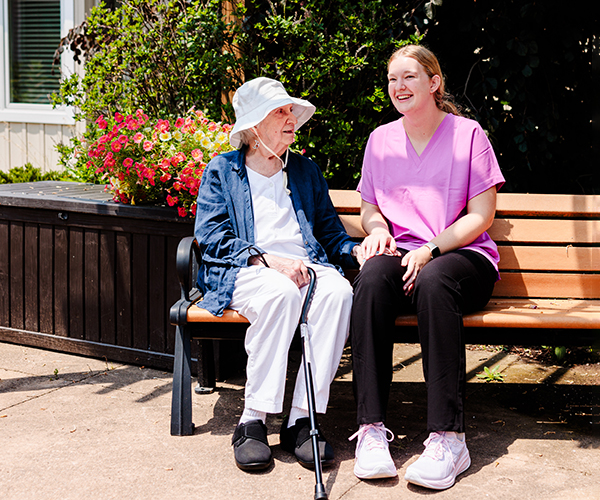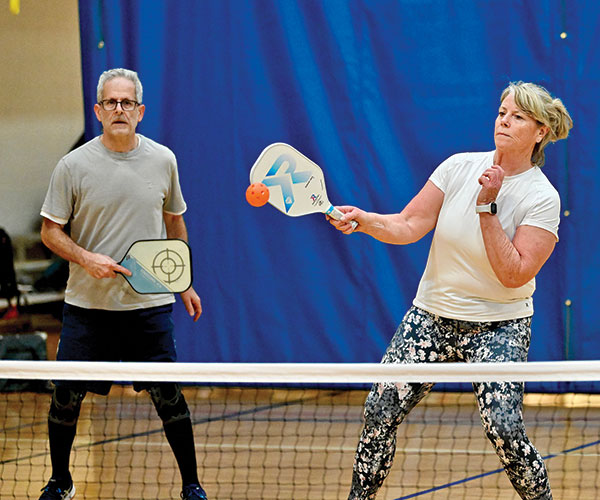Sandra Kiely Kolb sobbed as she waited for her youngest son, a new army recruit, to ship off from the United Service Organizations military processing station in Broadview Heights. A volunteer spotted her and crossed the room to give her a cup of coffee — a small gesture, but one that resonated with her.
Today, a year and a half later, Kolb’s son is serving in Iraq, and Kolb volunteers at the USO every Monday morning, offering worried parents coffee and a sympathetic ear. It’s the kind of hands-on volunteer experience that she has always cherished, but was unable to undertake during her 25 years at National City. Since her retirement, the former senior vice president is free to dedicate her previously meeting-filled days to serving others.
“What I wanted to do was take my avocation, which was the nonprofit world, and make it my full-time vocation,” says the 58-year-old Shaker Heights resident, who also serves on the boards of the The Cleveland Play House and Saint Luke’s Foundation of Cleveland. “I love having the luxury at my age to become a full-time volunteer. To me, it’s just the next stage, and it’s one that I gave a lot of thought to.”
To make her retirement as fruitful as her career, Kolb treated it like a job. She constructed a five-year timeline that reflected the things in her life — volunteerism, philanthropy — that made her happy, then planned them into her post-work days. Having set all her ducks in a row, Kolb’s transition into retirement was smooth.
Kolb is smart to plan ahead. Many near-retirees, who feel prepared financially, will not be as psychologically well-equipped for retirement as Kolb. And now, with the first baby boomers entering their 60s, millions will be challenged to create their new, non-working personas.
Emotional retirement planning, often overshadowed by money matters, is just as important. “It’s like financial planning: The more you think about it ahead of time, the more you can do to make this transition successful,” says Dr. Phillip Dines, a psychiatrist at University Hospitals Case Medical Center. “The more you wait to the last minute, the more difficult it becomes.”
Jean C. Setzfand, a national spokeswoman for AARP, agrees. “We want to avoid the retirement that accidentally happens to you, both financially and emotionally.”
Retirement is life-changing, not life-ending. Unfortunately, many people, wooed by the allure of a perpetual vacation, fail to make realistic plans. They forget to attend to some basic human emotional needs: intellectual stimulation, social interaction, physical fitness and meaningful structure. Soon-to-be retirees often underestimate the role that work has played in their life. Those who fantasize only about golf games and book clubs will find that they’ve created an unsatisfying, one-dimensional world for themselves.
Grahame Smith faced retirement several years ago after a jet-set 22-year career with the Goodyear Tire & Rubber Co. He’d moved his family to the Far East, including Japan and Singapore, for his job. So he knew that 18 holes of golf three times a week would not make a stimulating life for him.
“You need to know what you’re going to do with your time,” says Smith, 68, of Silver Lake. “There’s nothing worse than someone who’s just going to sit in front of the TV.” Before retirement, he fostered a lifelong interest in World War I military history into a second career as an internationally recognized firearms expert.
In the meantime, his wife, Victoria Todd-Smith, turned her passion — what used to be a home-based cooking and catering business — into a 60-hour-a-week profession. She is now the catering and banquet sales manager at Mustard Seed Market and Café in Solon.
“Our roles have really changed,” Smith says. “Now, I am the one at home, which is something different, but it works really well. I have my hobbies, and I help Vicki out with a little bit of the housekeeping.”
Retirement can significantly affect a marriage. Suddenly, spouses who’ve lived separate lives from 9 a.m. to 5 p.m. are together 24/7. The thought of spending all those hours together may be daunting or exciting, but in either case, the fantasy is unlikely to match the reality. The key to managing the change, as Smith has discovered, is twofold: Stay busy and keep the lines of communication open.
“It’s important to keep the dialogue going, so that the day after you retire, you won’t be skipping a beat,” says AARP’s Setzfand. “It shouldn’t be a huge shock to either one of you.”
Some couples seek professional advice to help ease them through the process. A therapist can conduct an “emotional checkup” and point out possible stumbling blocks, such as interpersonal and time-management issues, that may have arisen while they were spending their days apart, but which become more obvious when they’re together daily.
Being a single retiree poses different challenges, including an increased risk of social isolation. So maintaining contact with friends and family becomes even more important.
Work provides structure, and perhaps more importantly, it creates community. So retirees need to find both in new places and people.
Making friends of different generations and backgrounds is not only gratifying, but necessary. A retiree’s contemporaries are all reaching a certain age.
“You have to find a way to maintain relationships, just as well as create new ones. Otherwise, you’ll find yourself virtually alone, because they’ll be dying off,” says aging expert Georgia Anetzberger of Cleveland State University.
Anetzberger, who holds a doctorate in social work, says a friend started writing books after she retired and uses the royalties to take her family on exotic vacations.
The very definition of retirement is changing as more people pursue a second job. “There’s that aspect of not completely leaving work, not really for the money, but because it connects you to things,” Anetzberger says.
The reverse is also true: taking more frequent vacations in the years leading up to retirement makes for a practical trial period. Anetzberger says colleagues at CSU use sabbaticals to “see what it’s like not to go to work every day.”
Once the attraction of the never-ending vacation wears off, boredom can set in. Keeping the mind challenged is crucial.
“Retirement used to mean going to sit in a rocking chair on the front porch, and I think what it means now is the opportunity to start a new life,” says Kaye Grospitch, coordinator of the Active Minds/Project 60 program, which enables any Ohio resident age 60 or older to enroll in for-credit classes at CSU tuition-free.
Fitness can also play a large part in a healthy retirement. Dennis Kelly of South Euclid retired last year after 44 years as a manufacturing executive. A member of the Cleveland Skating Club, he exercises three days a week. “I’m probably in better shape now than when I was traveling and eating a million restaurant meals a month and not having the time to work out,” he says. Kelly schedules his training and tennis sessions around his other commitments, such as volunteering with Case Western Reserve University’s Association for Continuing Education annual book sale.
A successful shift into retirement comes down to a person’s innate flexibility, psychologists say. “People sometimes look at it as a terminal process instead of as a process of change,” says Dines. “So if you’re keeping an open mind … where you’re always learning new facts, new skills or adapting yourself, then you’ll be able to adapt to [retirement].”
Despite the best preparation, however, the reality of retirement still may come as a shock. “It’s sort of like giving birth to a child,” says philanthropist Kolb. “You never know how much it’s going to change your life until you do it.”



